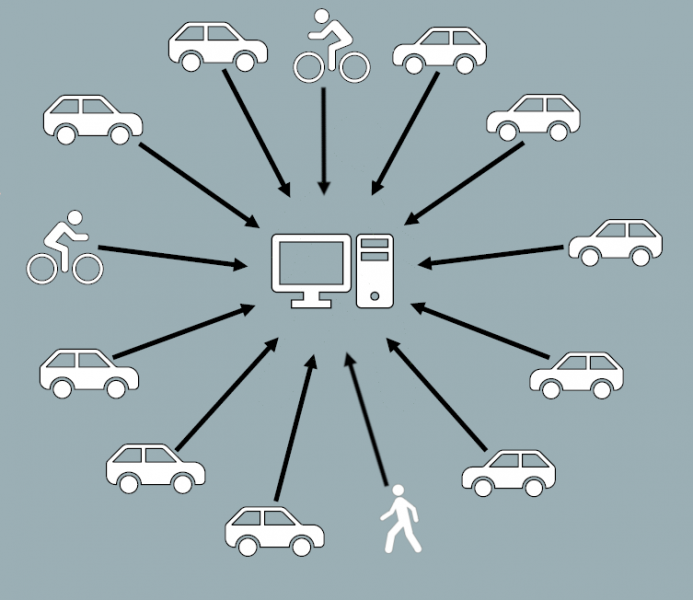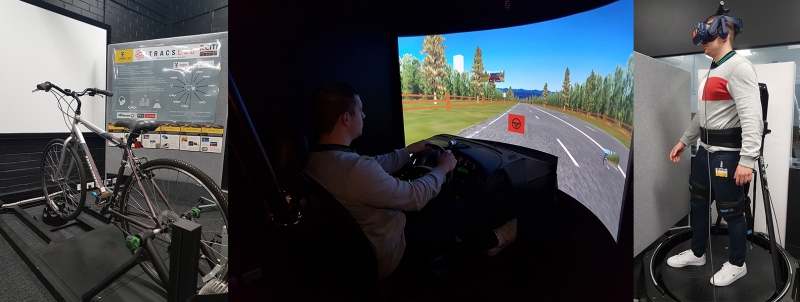TRACSLab

Lead CI: Prof. Vinayak Dixit
Manager: Mr. Julius Secadiningrat
Established from our ARC Linkage Infrastructure Equipment and Facility (LIEF) 2013 grant, the TRAvel Choice Simulation LABoratory, (TRACSLab) is a world-first in multi-modal, multi-user transportation visualisation platform. The facility allows researchers to study travel choice and interdependent behavioural characteristics by observation of group interactions.
TRACSLab @ UNSW is made up of transport simulators (i.e. driving, cycling, and pedestrian simulators) networked together to answer fundamental research questions relating to travel choice, drivers’ behaviour and human factors, risk and safety, automotive technology, and infrastructure design.
Transport Simulators for Safe, Flexible, and Consistent Testing Environment Generating Accurate Results
TRACSLab @ UNSW offers academic researchers, industry collaborators, and policy makers a safe and cost-effective platform to conduct experiment and test bedding of new technology or policy which otherwise would be too impractical or costly to be tested in real world. The facility is built on a custom simulator platform developed in-house by rCITI researchers and it is highly customisable and immersive. The open-source nature of the platform means that new functions can be programmed and added to suit each project requirements.
A high-fidelity environment can be 3D-modelled according to real world conditions, including traffic signage, building models, road furniture (bus stop, road lights, barriers, etc), road markings, etc and placed anywhere inside the simulation environment. Experiment parameters (e.g. weather, traffic composition and volume, time of day, etc.) can be set to consistently replicate a particular scenario. TRACSLab has also the ability to integrate with standard traffic microsimulation software, which are widely adopted in traffic studies and policy making process, to accurately simulates traffic behaviour. Complete observability and rich data collection are supported by state-of-the-art data collection instruments such as high-frequency data loggers, physiological monitoring devices, and eye trackers.

Multi-modal, Multi-users Interactive Environment in a Networked Platform
This set-up enables the ability to simulate interaction between multitude of users with each simulator act as a mobility agent in one virtual environment. TRACSLab simulators are also portable and easily transportable to any location around the world. Experiments can be conducted on an international scale through a high-speed internet network, which makes collaboration with overseas researchers a much more feasible proposition. TRACSLab @ UNSW is equipped with driving, cycling, and pedestrian simulators which are integrated in a networked platform. Each simulator is also customisable with the options of real car dashboard or 360-degrees virtual reality (VR) configurations depending on each project’s requirement.
Selected Use Cases
- Travel choice
- Design of traffic infrastructure and road network
- Human factors analysis of drivers’ behaviour
- Automotive technology and interface design
- Road policy and pricing
- Self-driving and connected automated vehicle (CAV)
- Intelligent transport systems (ITS)
- Drivers’ risk and safety
- Multi-modal interaction of road users
The future of TRACSLab
The TRACSLab team consists of leading researchers at rCITI and the iCinema Centre at UNSW whose expertise ranges from the use of stated choice experiments, travel network modelling and experimental economics in conducting travel behaviour research as well as simulation and visualisation.

For more information:
TRACSLab Manager, Julius Secadiningrat E: tracslab@unsw.edu.au




